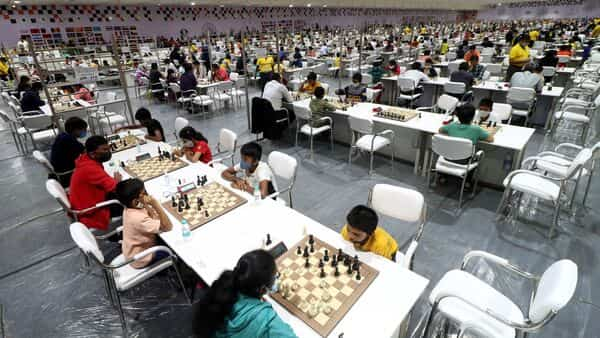If you have nowhere in particular to go and are in a hurry to reach there—so went the tagline of a sporty line of Mercedes Benz cars. Some kinds of fun can be expensive. Even second-hand ones, in which you are an observer and thus a vicarious, rather than a direct, participant, such as when you watch a game. Right now, chess lovers in Chennai are chafing at the price of a ticket to watch the 44th Chess Olympiad, which India got the chance to host, thanks to Russia’s invasion of Ukraine, stripping Russia of its chance to host the event. Daily tickets are going for ₹2,000 to ₹3,000 for the average Muthuvel—if you are a civil servant, a young chess enthusiast or a woman, you get to knock one zero out of that figure. Tickets to the Indian Premier League, (of cricket, of course), are way more expensive, even if the capacity of stadia that host them are 40-50 times as large as chess venues. But all these pale in comparison to the cost of a ticket to the Centre Court or Court Number One at Wimbledon. Regular tickets are allocated by lottery, or rather the right to buy a regular ticket is allocated by lottery. Then, there is the option of queuing up for three days—with an umbrella, sporting cheer and a stiff upper lip ready at hand, in which case, you can buy a limited number of regular tickets for as little as £27. If you love tennis and being seen at the Mecca of tennis, but balk at roughing it out for hours on end in queue, you have the option of buying debenture tickets. These are five-year qualified corporate bonds issued by the All England Lawn Tennis Ground Plc that offer guaranteed tickets to matches on Centre Court and Court Number One at Wimbledon. The 2021-25 series sold for an initial price of £80,000 in 2019, to be paid in three instalments, and these sold for as much as £120,000 in May 2021. The debenture buyer lends money to the issuer and is entitled to repayment. Only a pittance of the price of the debenture is repaid, the rest is a premium you pay for the privilege of buying the debenture and the assured tickets that come with them for each of the five years comprising the tenure of the bond. One of the sweet features of the Wimbledon ticket debenture is that it is exempt from capital gains tax—qualified corporate bonds have that privilege in British tax law, for reasons too arcane for mere mortals to venture to understand. The British Isles, let’s remember, also include tax havens such as Jersey and the Isle of Man, and London is also called Londongrad because of the city’s population density of Russian oligarchs squirrelling their wealth away outside the reach of Russia and President Vladimir Putin. In the case of the tickets you buy after winning a lottery, people have found such tickets get cancelled because they used the same credit card to buy more than one ticket. Such restrictions do not apply to the debenture tickets. So, if you want assured tickets that seat you side by side at a Wimbledon match, you need to be a Tennis great, a member of the British royalty, one of the 500 members of the All England Lawn Tennis Club or shell out to buy a debenture that gets you assured tickets—for a steep price. The Wimbledon ticket thus gets elevated to one of the many discreet charms of the bourgeoisie.
That risk is inherent in any mechanism that uses price to allocate a scarce resource. Such allocation with integrity is vital—viz the stampede and riot police action at the Stad de France UEFA championship final in May this year, in which not just inept crowd control but also a large number of fake tickets played a role. Is there some other way to distribute tickets that would not be considered arbitrary? An auction is the best way to allocate scarce resources. A Dutch auction, in which the seller starts with a high price and keeps lowering the price till all the goods on offer find buyers would probably be the most efficient. But that has one disadvantage: in the case of chess, grand master and five times world champion Viswanathan Anand might find himself priced out of a ticket to the chess tournament, even as a local builder walks in, struggling to find the flavour of caramelised popcorn past the taste of paan that had filled his mouth minutes before. A workable solution might be to allot a certain proportion of tickets to be allocated on the basis of willingness to pay, another lot, on the basis of demonstrated fondness for the game (score of the would-be ticket-buyer in a quiz on the game serving as a proxy, for example), proven expertise in the game (membership of chess associations, if not recognized professional ranking), and quotas for young enthusiasts and so on. An overarching solution is online streaming of the game, for access that is free, subsidized by advertising or at a very low cost. As more and more of India’s teeming millions rise above the tedium of subsistence and seek active or vicarious participation in assorted sports and games, how to manage that process fairly would be a challenge that would need to be addressed.
Catch all the Business News, Market News, Breaking News Events and Latest News Updates on Live Mint.
Download The Mint News App to get Daily Market Updates.
More
Less
Subscribe to Mint Newsletters * Enter a valid email * Thank you for subscribing to our newsletter.
Topics
.


